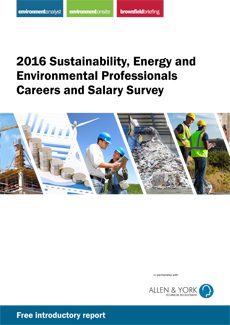
Prospects for the sustainability sector are perceived as strong, with a maturing of the industry and technical professionals dominating the jobs market. Miriam Heale at recruitment firm Allen & York summarises the highlights from its recent salary survey, published in partnership with Environment Analyst.
1,775 people took part the 2016 Sustainability, Energy & Environmental Professional Careers & Salary Survey, produced by market research expert Environment Analyst in partnership with Allen & York. The survey conducted in the early part of 2016 looks at the prospects for the sustainability sector, compares salaries across the industry and tracks progress on the last survey carried out in 2010.
Maturing and more experienced industry
The overarching conclusion we can draw from the survey is that of a profession which continues to mature in terms of age, length of service, specialist skills and career path. We are seeing a general rise in the level of experience with 42% of respondents having more than 11 years’ experience and the average age increasing from 37 to 41. Length of service is also rising and employees are staying longer with one employer, 39% for more than 5 years in 2016 which is a rise of 16% on 2010.
Improving prospects
Sustainability is still a maturing profession and in general career prospects are deemed to have improved, between surveys taken in 2010 and 2016, when the proportion of respondents rating them as ‘good’ or ‘very good’ rose from 32% to 53%.
Across the private sector just over 50% of consultant respondents believe the number of consulting jobs has increased in the last 12 months, however only 7% of public sector workers believe staff numbers in their organisations are increasing.
Public sector jobs in decline
Since the UK government instigated sweeping austerity measures in 2010, the public sector has seen a stagnation of job and career prospects within the sustainability sector. 92% of survey participants said that jobs within the public sector have remained static or are in decline and 40% felt that jobs were less secure compared with 12 months ago. However, this is in sharp contrast to a more optimistic 53% who see consulting jobs, predominately in the private sector, on the rise. There seems to be evidence that the private sector is stepping in and taking up the slack, providing the skills when and where they are needed.
Highly qualified workforce
The Sustainability, Energy & Environmental profession remains a highly qualified one with 95% of those questioned educated to at least degree level and 44% holding a Master’s Degree. Technical skills dominate with 41% describing their main role in the organisation as being a technical one – for example in disciplines such as air quality, ecology and waste management.
Salaries
The salary survey flags up a gender pay gap, which is more reflective of the jobs market as a whole, rather than being particular to this industry. At Allen & York we see no difference in pay between men and women at the same level. However there are still more men in senior positions and working in better-rewarded areas.
At director, associate or partner level, work for a consultancy and your average pay is around £63k. Those in the corporate/industrial sector are likely to be paid around £73k and those in the environmental industries and public sector around £57k. According to the survey due diligence pays best at specialist/technicians/consultant grade (£41k average salary) while air, noise and acoustics, and waste management and recycling pay is the poorest (£28k).
Salaries in 2016 are going up faster than in 2010, but there are still around 30% of interviewees who reported no change (no pay rise) over the last 12 months. In terms of getting a reasonable pay increase, your best bet as an employee seems to be if you are working in renewable energy (4.1% increase in average salary over the last 12 months).
Future prospects perceived to be good
Prospects for the sustainability sector are still seen as good (67% of participants) – this is at least partly due to a closer synergy between environmental and social issues. Of course now, post-Brexit, we are moving into unchartered waters and as 70% of our environmental safeguards and legislation is European legislation we will have to see how this unfolds for the UK.
For more information and to download a free summary of the salary survey, visit the Allen & York website at www.allen-york.com.







